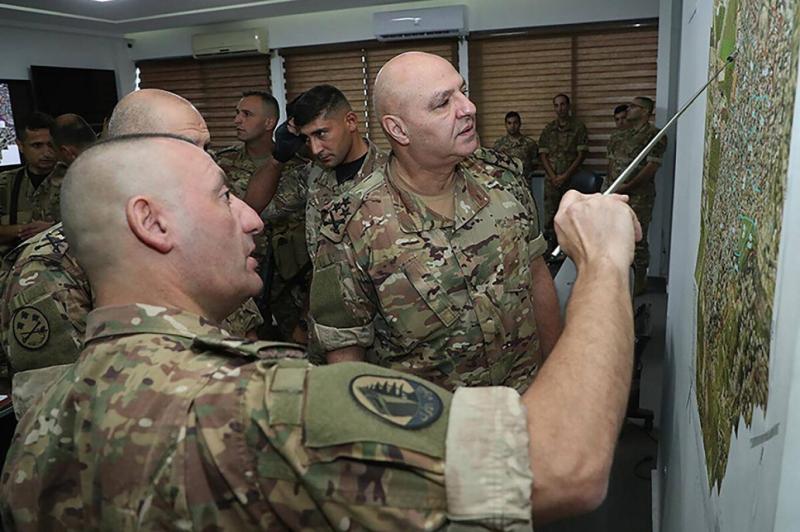It is assumed that the last phase of the unprecedented debate and the conflict among the factions surrounding the army commander is not just about him, but is also tied to the expectations of what will emerge from the Cabinet meeting. What is anticipated to happen will not stop at the decree or decision but will extend into the military institution: headed by a commander who remains in position despite violation, and whose extended term has been challenged. Unless something unforeseen happens to disrupt the scheduled Cabinet session today in this state of surprises, it will likely involve the following:
1. Accepting the content of a legal opinion prepared by retired judge Youssef Nasr, who is a former president of a chamber in the State Council and has extensive experience in employee affairs and their laws. He was appointed during the tenure of the previous Secretary-General of the Cabinet, Suhail Bouji, to the presidency of the Cabinet, and remained there as a legal advisor after his retirement. The opinion indicates that the Cabinet can proceed to dismiss the specialized minister, allowing the council to issue a postponement of Army Commander General Joseph Aoun's dismissal without Minister Maurice Slim.
2. What is supposed to emerge from the Cabinet meeting is a postponement of the army commander’s dismissal for six months and the appointment of Chief of Staff Brigadier Hassan Aouda, promoting him to the rank of Major General. A postponement of dismissal, which is illegal unless issued by the competent minister, can suffice with just a simple majority, while appointing the chief of staff requires two-thirds of a quorum that can only be achieved with two-thirds of its ministers present. This means that the Hezbollah ministers are not keen on the first action but support the second.
As with the appointment of the army commander and the postponement of their dismissal by decision of the Minister of Defense, the same applies to the appointment of the chief of staff by a similar decision "based on the Army Commander's consultation," which is originally non-binding in the National Defense Law. What the minister will not do for the commander by postponing his dismissal, will he do for Aouda by agreeing to his appointment based on Article 21 of the Defense Law?
3. The worst-case scenario is the appointment of a chief of staff without the minister in charge, resulting in a scandalous violation. The appointment of a new chief of staff – after resistance – has the support of former MP Walid Jumblatt, and his current successor, MP Taymour Jumblatt, expressed his support before Jumblatt Sr. announced this choice. Previously, efforts were made to prevent this and tie his approval to the extension or postponement of Aoun's dismissal. An additional factor that strengthened Aouda’s prospects, aside from his electoral base, is the American embassy, which has previously tested him as the commander of the 11th Brigade in Metn, maintaining its security and protecting the premises. Aouda was also a candidate for the position of army commander long ago and received advice to cultivate relations with the Druze leader father and son.
4. A six-month postponement of the army commander’s dismissal still struggles with whether it will be issued as a decision or a decree. Both are legally invalid without a proposal from the Minister of Defense. The justification presented for what will happen is that Slim failed to perform his duty, which could supposedly compel the Cabinet to assume authority over the minister, either by decision or by decree. Such an action would be subject to challenge. The anticipated procedural issue arises from the lack of an administrative form to present it, as a decree without the signature of the competent minister is considered non-existent and null, as though it had never been, contradicting Article 54 of the Constitution, unless the intention is for an unprecedented decree that closely resembles a “Khenfshari” one.
5. Anticipating the actions that the Cabinet will take today, the Minister of Defense sent a message to Prime Minister Najib Mikati announcing his readiness to perform the legal requisite to find a permanent solution to the potential vacancy in the army leadership, the chief of staff, and in the military council, basing his letter on reminding Mikati of agreements made between them in previous meetings, and in compliance with the constitutional rules and relevant legal procedures. In doing so, Slim aimed to refute the Cabinet's claims and accusations against him beforehand by asserting his authority and expertise, to add legal violations to the action of the Cabinet in the absence of a competent minister.
6. It is certain that the Free Patriotic Movement will challenge the action taken, which is the postponement of the army commander’s dismissal. However, whispers suggest that Mikati wished for State Council President Fadi Elias, appointed to his position by President Michel Aoun and distanced from the president’s party, not to issue a decision to suspend the execution of the decree or decision postponing the dismissal. It is customary in all administrative challenge reviews to accompany them with requests for suspension of execution. The appointment of a chief of staff could relieve some embarrassment for Elias and fulfill his obligation to the Prime Minister, as long as the grounds for the challenge are cohesive, issuing a decision to suspend execution and allowing Aouda to take Aoun's place, thus preventing the military institution from suffering from a loss of its head. It would then have a temporary leader. Suspending execution removes Aoun from office after January 10, placing Aouda in his stead, thus attempting to remediate any gap in the postponement of the dismissal. The well-calculated move is to retain the current commander.
According to Article 80 of the State Council Law, there is a period of four months to respond to the lawsuit. However, the decision to suspend or not is based on the grounds of the challenge and its solidity and strength, depending on what is stated in the third paragraph of Article 77 of the Council Law, which states that "suspension of execution is not allowed if the review aims to annul a regulatory decree or annul a decision concerning public order, security, or public health." This is the justification advocates of the postponement of dismissal aim to leverage by rejecting the challenge: preserving order or security.
In the State Council Law, enforced by Decree 10434 issued on June 14, 1975, there is discretionary power to suspend execution. In the first paragraph of Article 77, it states that the review "does not suspend the execution of administrative action," while the second paragraph asserts its right to suspend "if it becomes clear that execution could cause significant harm to the applicant and the review is based on serious important reasons."
7. Lastly, to communicate the decree or decision to the concerned party, which is the Army Commander, it must pass through the relevant Minister of Defense, who is responsible for informing the commander and cannot be bypassed for at least two fundamental reasons: first, Article 66 of the Constitution, which establishes the minister as the master of his administration, being solely responsible for the operation of its laws and regulations. Secondly, Article 15 of Legislative Decree 102/83 (National Defense Law) states that the Ministry of Defense "is subject to the authority of the Minister of National Defense, who is responsible for executing all its tasks."




